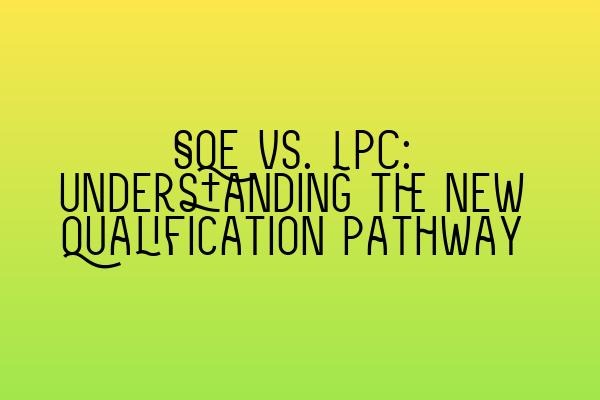As a solicitor, writer, and SEO expert at Free Mocks SQE Training, I understand the importance of providing comprehensive information to aspiring lawyers. Today, I will shed light on the SQE vs. LPC debate, helping you understand the new qualification pathway in the legal profession.
The Solicitors Qualifying Examination (SQE) and the Legal Practice Course (LPC) both serve as pathways for individuals seeking admission into the legal profession in England and Wales. However, there are important differences between these two qualifications that every prospective lawyer should be aware of.
Let’s begin by exploring the SQE, which is a universal assessment for solicitors introduced by the Solicitors Regulation Authority (SRA). The SQE replaces the traditional routes to becoming a solicitor, including the Graduate Diploma in Law (GDL) and the LPC. This new assessment is designed to ensure that all solicitors meet the same high standards regardless of their background or training.
The SQE is divided into two stages – SQE1 and SQE2. SQE1 focuses on the technical legal knowledge required to be a solicitor, while SQE2 assesses practical legal skills, such as client interviewing, legal drafting, and advocacy. This new qualification pathway offers a more flexible approach, allowing candidates to choose from a range of preparation courses and exams that best suit their learning style and career goals.
On the other hand, the LPC has long been the traditional route to qualifying as a solicitor. It is a postgraduate vocational course that provides practical training to enhance legal skills. The LPC is more classroom-based in nature, offering a structured learning environment with a set curriculum. It covers various areas of law, including contract law, criminal law, and commercial law.
One of the key advantages of the SQE is its cost-effectiveness compared to the LPC. The traditional LPC can be quite expensive, while the SQE aims to provide a more accessible and affordable route to qualification. This makes it an attractive option for aspiring solicitors who are conscious of their financial commitments.
Moreover, the SQE’s focus on practical skills ensures that candidates are well-equipped to handle the demands of real-world legal practice. While the LPC covers essential legal principles, the SQE places a greater emphasis on the application of legal knowledge in practical scenarios. This shift aligns with the evolving needs of the legal industry and the expectations of employers.
It is worth noting that the transition from the LPC to the SQE is not mandatory. Individuals who have already embarked on the LPC route can still qualify through the traditional pathway. However, for those starting their legal studies or considering a career change, the SQE offers a new and promising route to becoming a solicitor in England and Wales.
To summarize, the SQE and the LPC are two distinct qualification pathways for aspiring solicitors. The SQE, introduced by the SRA, offers a flexible and cost-effective approach to qualification with a focus on practical legal skills. The traditional LPC, on the other hand, provides more classroom-based training and has been the conventional route to becoming a solicitor.
Ultimately, the choice between the SQE and the LPC depends on your individual circumstances, career aspirations, and preferred learning style. It is crucial to research and assess both options thoroughly before making a decision. Regardless of the pathway you choose, remember that dedication and hard work are key in your journey towards becoming a successful solicitor.
At Free Mocks SQE Training, we provide comprehensive resources and guidance to help you prepare for the SQE and navigate the new qualification pathway with confidence. Our expert team is committed to supporting aspiring solicitors in their journey towards achieving professional excellence.

Leave a Reply